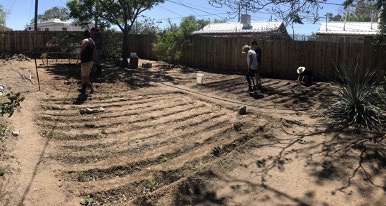Food Sovereignty is Necessary
Originally published by The Coalition to Stop Violence Against Native Women on June 2020.

In late March, when COVID-19 materialized in New Mexico, many community organizers, began to scramble to find ways to support our people who were stressed to find food for their families during the stay at home order. Food security was a huge issue here in our traditional Tiwa territory also known as Albuquerque for the urban Native population and an even bigger issue in tribal communities. We began helping people get their gardens ready to plant. We pulled weeds, tilled the ground, began composting, held indigenous seed exchanges, built garden boxes and began planting. We created training to teach others planting skills so everyone’s gardens would be more successful. For those of us who are boots on the ground in indigenous communities, we know that we can’t wait around for colonizers to save our people who have been historically overlooked. We have to save ourselves. Planting our own food is the answer.

The emergence of COVID-19 has hit Native communities harder than non-Native communities. Right now, Native Americans make up 50% of the New Mexico COVID-19 deaths although Natives only make up 11% of the state’s population. Health disparities are becoming increasingly more visible and are growing. How can we work to minimize the impacts of systemic violence exacerbated by COVID-19 and improve the health and well-being of tribal communities? Two words: community gardens! When we grow our own fruits and vegetables, we take our food sovereignty into our own hands. Food sovereignty is violence prevention.

Tribal communities are forced to deal with little to no access to healthy food like fresh fruits and vegetables, lack of access to healthcare, running water, cleaning supplies and personal protective equipment (PPE) like masks, gloves, and hand sanitizer. These health disparities are exacerbated during the crisis. Additionally, the overburdened Indian Health Service does not adequately test or treat Native peoples with COVID-19. Mutual aid efforts have been popping up everywhere by community organizers because our current systems are failing Native people. Many people are scrambling to acquire food and cooking supplies to provide to folks who are struggling with food insecurity.
When we grow our own fruits and vegetables more of them will be readily available to consume or even trade each other for other goods. If more people increase the amount of fruits and vegetables they eat, the benefits will show with improvements in health. Healthy diets have been shown to lessen effects of diabetes and heart disease, which plague Indian Country. Healthy diets rich in vitamins and nutrients could also help improve the health of those battling COVID-19 which could increase their rates of survival.

An integral part of food sovereignty is seed saving. Native peoples have saved seeds since time immemorial. Some tribes have created seed banks to catalog their indigenous seeds and ensure the viability of their seeds. If tribes began creating indigenous seed banks on a large scale and made them available to Native community members, they could support their communities’ food security. Acoma Pueblo has created a seed bank of indigenous seeds that they have made available to their members. Their seed bank is a resource that makes gardening more accessible to the people of Acoma.
When COVID-19 hit, food shortages started happening everywhere including food deserts. People were stockpiling meat, eggs, ingredients for baking, fruits, and vegetables.
Many tribal nations live in food deserts such as the Navajo Nation. The Navajo Nation is the size of West Virginia but only has 6 grocery stores which on average have higher prices for everyday food items than elsewhere. These stores are PACKED with unhealthy processed foods and severely lack healthy fresh foods. Navajo people are dependent on these stores for their essentials or must drive to a neighboring border town just outside the Navajo Nation.

Border towns like Gallup and Farmington have historically been racist to Navajo people. Navajos deal with issues like profiling and police violence. If more Navajo’s grow their own food, they would be less dependent on grocery stores for healthy fruits and vegetables and less subject to fluctuating prices in grocery stores. By taking less trips to the grocery store, Navajo’s would minimize their risk to being exposed to COVID-19, would reduce their need to travel to border towns for supplies, and would lessen their chance of becoming violenced.
Tribal nations have been asserting their sovereignty by creating laws and policies aimed at increasing quality of life for their people for many years. We should continue to create opportunities for food sovereignty and enable people to grow their own food. Access to healthy food should be a human right because food sovereignty is violence prevention.
